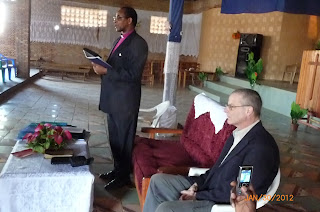
Pastor Emmanuel teaching at Nyanza, RW
Forgiveness & Reconciliation TOT group at Kigali, RW

Nyamata & Nyanza, RW--Biblical Stewardship
Following my last report, we did 2 Biblical Stewardship conferences, in Nyamata and Nyanza, RW. The second one, I thought, was more productive in that the vast majority of the 42 participants were actual pastors. They were engaged, asked quite a few questions, and committed to apply what they learned. At the first conference about half of the 40 participants were not actual pastors, but were deacons, youth leaders, women's group leaders, etc. Of course, none of our teaching is "wasted." Nevertheless, I want to focus my attention on equipping those who are in the position and authority to actually implement the changes we talk about at the conferences.

Forgiveness & Reconciliation TOT group at Kigali, RW

I returned home Sunday afternoon from the trip to Rwanda and Burundi. I am happy to say that the food poisoning and malaria have healed. Thank you very much for your prayers. I'm just a little under the weather, but that is more nose and throat, related (I think) to flying in airplanes for about 24+ hours with lots of other people and recirculated air.
Nyamata & Nyanza, RW--Biblical Stewardship
Following my last report, we did 2 Biblical Stewardship conferences, in Nyamata and Nyanza, RW. The second one, I thought, was more productive in that the vast majority of the 42 participants were actual pastors. They were engaged, asked quite a few questions, and committed to apply what they learned. At the first conference about half of the 40 participants were not actual pastors, but were deacons, youth leaders, women's group leaders, etc. Of course, none of our teaching is "wasted." Nevertheless, I want to focus my attention on equipping those who are in the position and authority to actually implement the changes we talk about at the conferences.
Kigali, RW--Forgiveness & Reconciliation TOT
We concluded with what I thought was a very productive TOT on Forgiveness & Reconciliation in Kigali, RW. It was the first time we had done Forgveness & Reconciliation. As you might imagine, there is a great need for a good understanding of forgiveness and reconciliation--and how to practically do those things--given the genocide that took place in Rwanda 18 years ago, as well as all the "normal" inter-personal conflicts that plague people. The 14 TOT participants engaged in many lengthy and spirited discussions concerning all aspects of forgiveness and reconciliation. I think we all have a much better understanding of this, and they seemed eager to teach their people about the important principles we talked about. It was an encouraging way to end the trip.
We concluded with what I thought was a very productive TOT on Forgiveness & Reconciliation in Kigali, RW. It was the first time we had done Forgveness & Reconciliation. As you might imagine, there is a great need for a good understanding of forgiveness and reconciliation--and how to practically do those things--given the genocide that took place in Rwanda 18 years ago, as well as all the "normal" inter-personal conflicts that plague people. The 14 TOT participants engaged in many lengthy and spirited discussions concerning all aspects of forgiveness and reconciliation. I think we all have a much better understanding of this, and they seemed eager to teach their people about the important principles we talked about. It was an encouraging way to end the trip.
EPI on the Radio
Theophile Rugubira will be following-up in a few months time to assess the impact of what we did. Further, he now has the opportunity to host a radio program every week in which he will teach EPI's material (probably beginning with Biblical Stewardship), field questions from the audience, and discuss our material with pastors whom we have taught and others. Thus, we have the opportunity to be heard by millions. The cost will be $100 per month. This is a cost-effective way to get EPI's teachings out to a large number of people. As always, your tax-deductible donations to EPI (which can be made online at EPI's website [http://www.equippingpastors.com/] or checks can be mailed to me at 714 S. Summit St., Appleton, WI 54914) will prove important as we begin this new venture.
Theophile Rugubira will be following-up in a few months time to assess the impact of what we did. Further, he now has the opportunity to host a radio program every week in which he will teach EPI's material (probably beginning with Biblical Stewardship), field questions from the audience, and discuss our material with pastors whom we have taught and others. Thus, we have the opportunity to be heard by millions. The cost will be $100 per month. This is a cost-effective way to get EPI's teachings out to a large number of people. As always, your tax-deductible donations to EPI (which can be made online at EPI's website [http://www.equippingpastors.com/] or checks can be mailed to me at 714 S. Summit St., Appleton, WI 54914) will prove important as we begin this new venture.
Thank you for your friendship, prayers, and support. I will be home until I leave for Kenya on March 30. During that time I want to make a number of additions and revisions to my materials on Biblical Theology, and a few to Biblical Eschatology, as well as work on proofing translations, and other things. If you have any questions, please feel free email me. God bless you. I will keep you advised of all major developments. Jonathan















